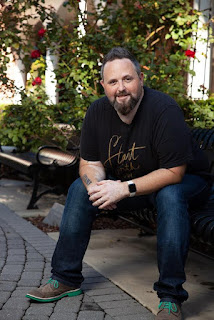
Welcome to beentothemovies.com, your ultimate destination for all things cinema! Dive into the latest movie news, in-depth reviews, and exclusive trailers that keep you updated on the hottest releases and hidden gems. Whether you're a blockbuster enthusiast or an indie film aficionado, Beentothemovies.com offers insightful critiques, behind-the-scenes looks, and expert analysis to enhance your movie-watching experience. Stay informed, entertained, and connected within the world of movies.
Saturday, 9 February 2019
Interview with Kevin O’Brien
After losing his wife and counselling practice, the only thing 32-year-old Dave Hopper has going for himself is his part-time professorship at his alma mater, a growing Christian college. And the only reason he even got that job was because his previous professor, now ambitious dean, pulled a few strings.
The dean’s plans for growth hit a snag when the property he wants to develop has been promised to a gay support group – which has plans to open an LGBT homeless teen shelter if they can raise the money in time. The dean is forced to take drastic measures, offering Dave his dream job, but he only gets it if he goes undercover in the group and stops them from raising the funds needed to buy the property.
Dave reluctantly agrees, and for the first time, is met face-to-face with the community he has been counselling against his entire career. The awkward and emotional experiences that follow lead Dave on a journey of truth, revealing that life and love are not as black and white as he first thought.
That’s the plot of the new film AT THE END OF THE DAY, releasing Feb 26 on VOD. We speak to the film’s writer-director Kevin O’Brien.
How did the film come about, sir?
Hustle. Nonstop hustle. Along with a splash of luck, and collaboration with an incredibly talented cast and crew. The story grew out of my own faith journey. As I grew older, I met some fabulous people and began to gain a deeper understanding of love and faith. This evolution compelled me to help others see the world with such beauty, and this story came out of that desire.
Tell us about the script – was it inspired by anything in particular?
The biggest inspirations from the film came from the relationships with my friends and members of our local PFLAG (Parents and Friends of Lesbians and Gays) Support Group. I had so many stories and personalities to pull from. I was constantly impressed by the generosity and faith of the LGBTQ community, especially considering how many within the Church has caused them harm.
How similar a film to Boy Erased is it? They both would seem to have their common threads…
Yes, both films explore the damage that religion has cause so many in the LGBTQ community. I would say they are rather different in tone. Boy Erased is a true story, whereas At the End of the Day is fictional, with a much lighter, comedic tone. Our story follows a conservative, Christian professor, who begins to ask questions he’s not supposed to ask.
Are any of the characters based on yourself?
Not particularly. While the lead character’s internal journey was the same as mine, the actual plot is fictional. However, I had to ask many of the same questions, and build relationships with many of the same people, as Dave did. It’s only through those relationships that we can grow.
How tough is it for not only you as a filmmaker, but for your cast, to shoot some of those heavier scenes?
Some of them were rather emotionally draining. Certainly, more-so for the actors. They were brilliant and beautiful and gave 100% every take. I often felt like it was my job to stay out of their way and not screw them up.
How did you come down from those heavy scenes at the end of the day?
Well, most of the time the schedule was so tight that there wasn’t enough space to process those during production. One particular scene, where we hear the stories of 4 youth who faced religious rejection, was certainly the most powerful and emotional. We all needed some time to sit in that heaviness, and honor the courage of those youth.
How did you find the right male lead?
I think I got crazy lucky! Stephen found us through a Facebook post for the role, and it was getting close to the beginning of production. Stephen was really the first audition that I felt really “got” Dave, and I think that’s confirmed by the reactions from the audience. Stephen was able to be sympathetic even though he was portraying a less-than-ideal character.
When did you watch your first cut? Have to lose much in the editing room?
Considering I was also the editor on this movie, I saw the first cut as it was put together. But that first time I watched the movie all the way through was incredibly magical. Granted, it was way too long, and didn’t have any music - but we had an actual movie! The final cut is about 35 minutes shorter than that first cut, and the movie is certainly better because of it.
What’s the message behind this movie?
Ultimately, the message is to listen to and honor the lived experiences of others. The movie specifically deals with the topic of the LGBTQ community and people of faith, but it’s also bigger than that. In general, it’s hard for humans to stop our busy lives and try to understand someone else’s journey, but that hard work is exactly what we need to bring unity.
Labels:
Kevin O’Brien







